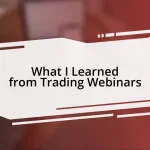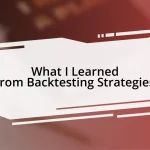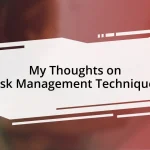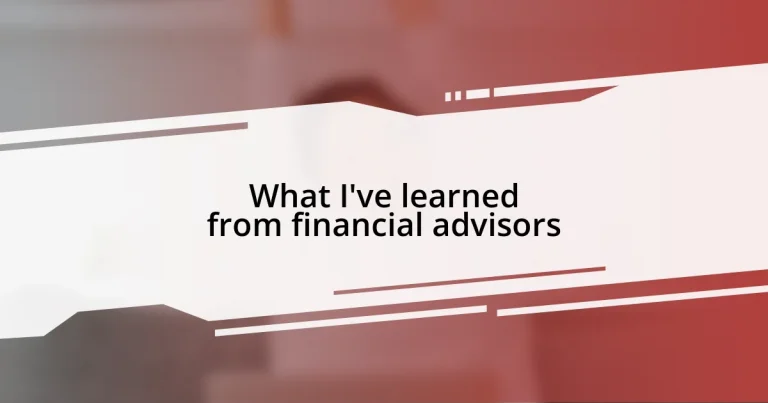Key takeaways:
- Understanding the different types of financial advisors is crucial, particularly the distinction between fiduciaries and commission-based advisors, which affects their level of commitment to your best interests.
- Asking key questions during initial meetings, such as an advisor’s background, fee structure, and success metrics, builds trust and clarifies expectations.
- Diversifying investments, establishing an emergency fund, and regularly reviewing financial plans are essential strategies advocated by advisors to enhance financial security.
- Engaging in continuous education and proactive communication with advisors fosters a stronger partnership and empowers informed financial decisions.
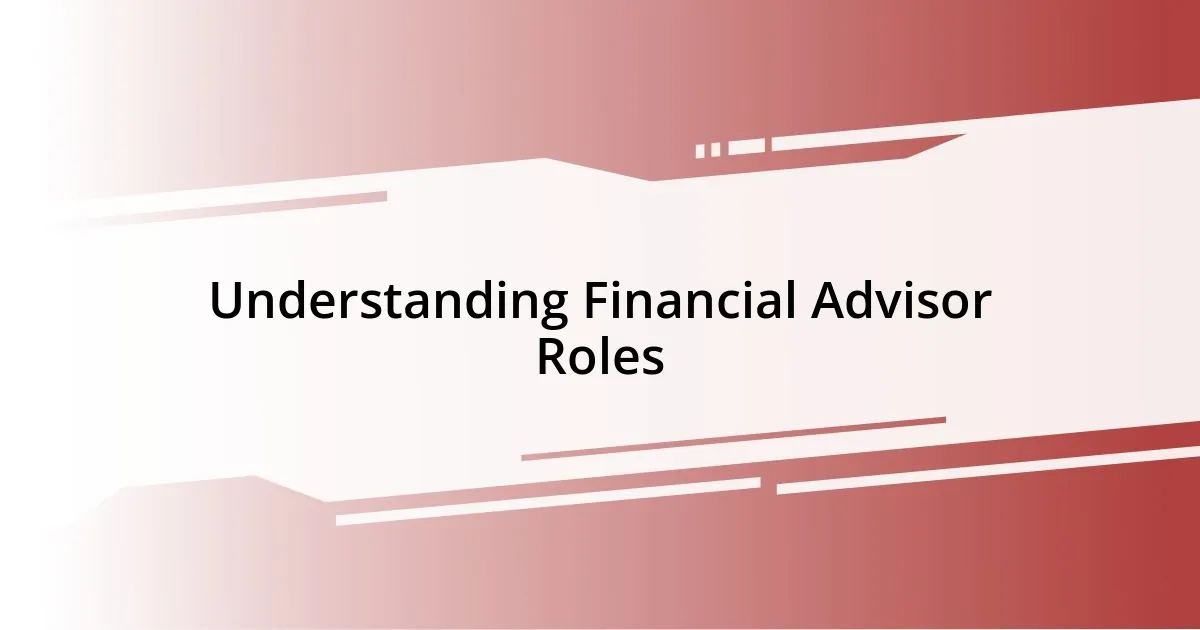
Understanding Financial Advisor Roles
Financial advisors play a vital role in guiding clients through the often-turbulent waters of personal finance. It’s interesting to reflect on my experiences with various advisors; each brought a unique perspective on investing, saving, and planning for the future. Have you ever wondered how much an advisor can impact your financial journey? In my case, even small adjustments they suggested led to significant changes in my overall strategy.
There are different types of financial advisors, from fiduciaries who are legally bound to act in your best interest to commission-based advisors who earn money from product sales. This distinction highlights a crucial question: Who’s really looking out for you? When I first met a fiduciary, I was impressed by their commitment to transparency; they took the time to break down my options without any pressure to make immediate decisions.
Moreover, many advisors specialize in specific areas like retirement planning or tax strategies, which can make all the difference in how you approach your financial goals. I vividly remember working with an advisor who specialized in retirement; their tailored advice felt like a personalized roadmap. It encouraged me to think critically about my long-term aspirations. Have you ever considered how a specialized advisor could reshape your financial outlook? It’s a journey worth exploring.
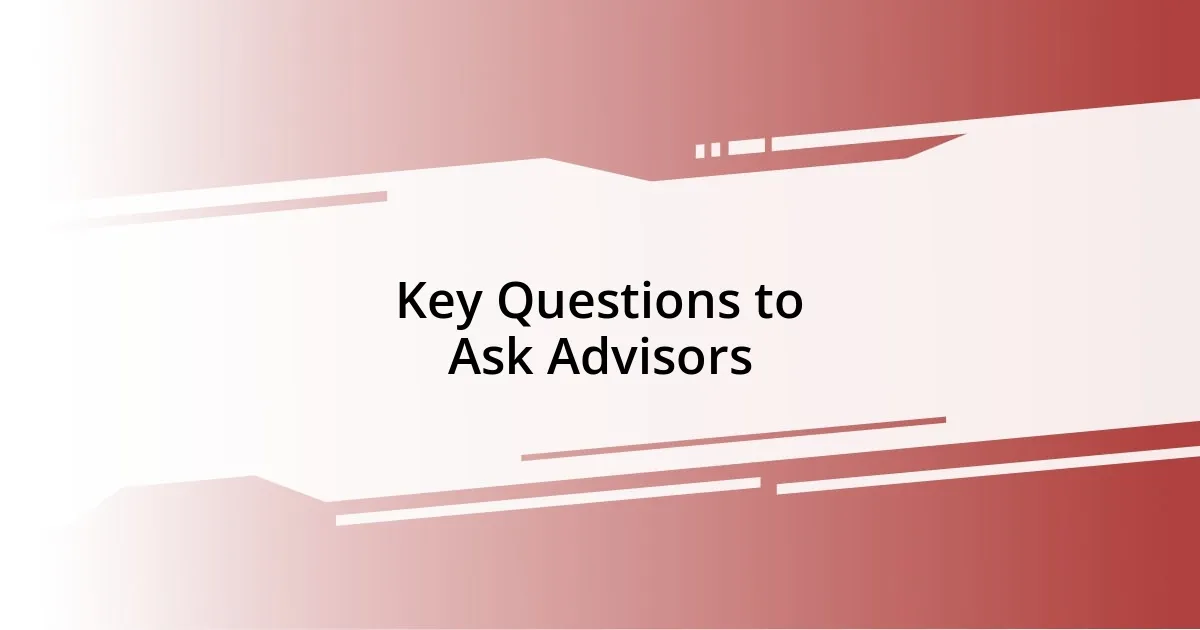
Key Questions to Ask Advisors
When engaging with a financial advisor, it’s essential to ask about their experience, qualifications, and specialization. I remember my first meeting where I confidently inquired, “What’s your background in financial planning?” It set the tone immediately; the advisor opened up about their journey, experiences, and the expertise they brought to the table. This conversation not only boosted my confidence in their abilities but also helped forge a rapport built on trust.
Another vital question involves understanding their fee structure. Early on in my financial journey, I learned the hard way that not all advisors charge the same way. Asking, “How do you get compensated?” helped unveil the advisor’s motivation and potential biases in their recommendations. Clarity on fees can make or break a relationship; I felt a strong sense of relief once I understood that my advisor’s income was linked to my success, not just commission on products sold.
Lastly, I strongly recommend asking how they measure success. I’ve found that clarity in metrics helps set realistic expectations and builds accountability. During one of my discussions, I posed the question, “What metrics do you use to gauge client success?” Their response not only showed their commitment to my financial health but also aligned our goals. It truly highlighted the importance of having a shared vision.
| Key Questions | Purpose |
|---|---|
| What’s your background in financial planning? | To gauge the advisor’s experience and expertise. |
| How do you get compensated? | To understand the advisor’s fee structure and potential biases. |
| What metrics do you use to gauge client success? | To establish shared goals and expectations. |
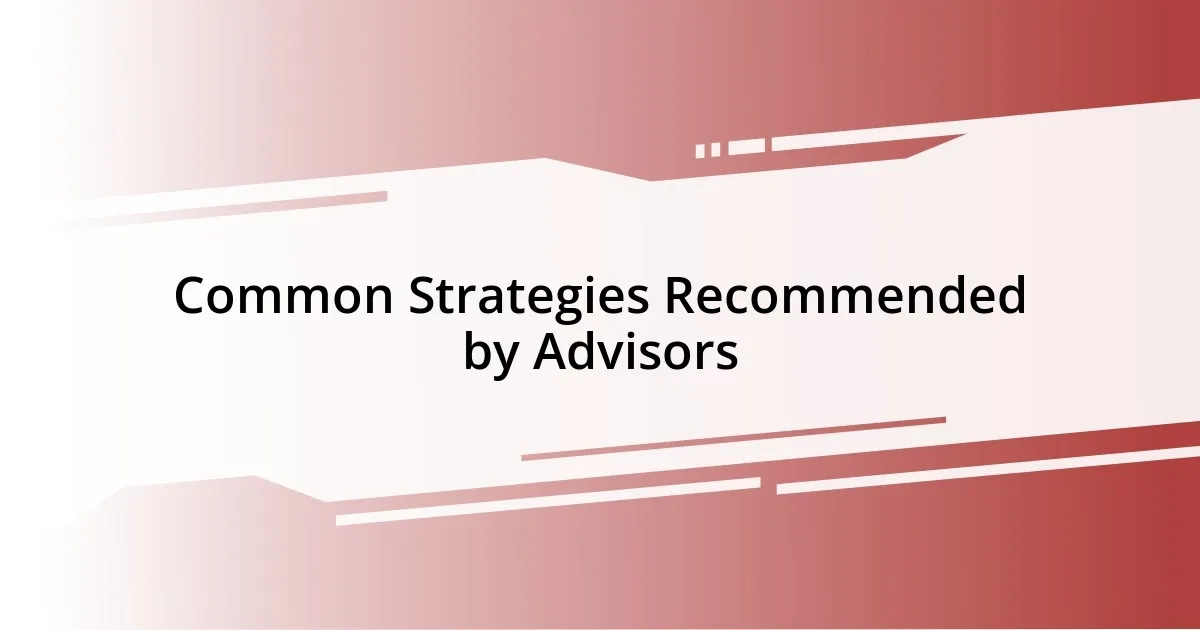
Common Strategies Recommended by Advisors
Advisors often emphasize the importance of diversification in an investment portfolio. From my own experience, I learned that spreading investments across various asset classes—like stocks, bonds, and real estate—can mitigate risk and enhance potential returns. There’s a sense of security that comes from knowing your investments aren’t all tied to one source.
Here’s a closer look at some common strategies financial advisors recommend:
- Diversification: As mentioned, splitting investments helps manage risk.
- Emergency Fund: Advisors often stress having three to six months’ worth of living expenses saved to handle unexpected expenses. I felt a wave of relief when I established my own fund; it transformed my financial mindset.
- Retirement Contributions: They typically encourage maximum contributions to retirement accounts like 401(k)s or IRAs, which not only provide tax benefits but also build wealth. The peace of mind this brings is incomparable as I’ve learned to view retirement savings as non-negotiable.
- Regular Review: Advisors suggest periodic reviews of your financial plan to adapt to changing life circumstances. I’ve found that regular check-ins help re-align my priorities and keep my goals fresh and motivating.
In discussing long-term financial goals, advisors also prioritize starting early, which plays a critical role in wealth accumulation. Reflecting on early conversations, I realized the magic of compounding interest; the sooner I invested, the more my money could work for me. This concept can sometimes feel abstract until you see the numbers add up over the years, reinforcing the idea to make every dollar count.
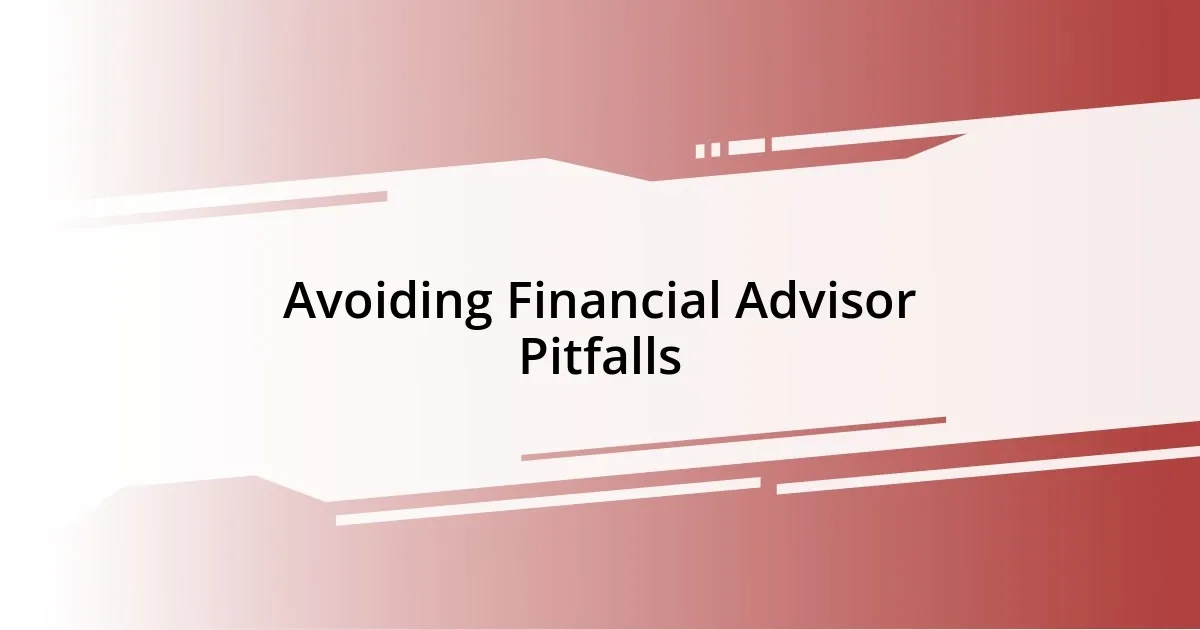
Avoiding Financial Advisor Pitfalls
One significant pitfall I’ve encountered while working with financial advisors is assuming all their advice is suited to my unique circumstances. I remember how I initially took their recommendations at face value, thinking they were tailored for me. But I soon realized that generic advice could lead me astray. I’ve learned that it’s crucial to question how their strategies align with my personal goals and risk tolerance. Are they asking the right questions about my life, or are they just running through a standard playbook?
Another common mistake is overlooking the importance of communication style. Early on, I found myself frustrated when my advisor used jargon I didn’t understand. It felt like we were speaking different languages, which only added to my confusion. Regular discussions are vital because clarity breeds confidence. I now make it a point to evaluate how well my advisor explains things, asking myself: Do I feel empowered with knowledge after our meetings, or do I leave feeling more lost?
Lastly, I’ve seen many people fall into the trap of not regularly revisiting their financial goals with their advisor. I once neglected to check in about my long-term plans and was surprised to find my priorities had shifted significantly over the years. Have you ever felt that way? It’s easy to put everything on autopilot and assume everything is fine. What I’ve learned is that taking time to reassess ensures I stay on track and that my advisor remains aligned with my evolving goals. Regular reviews foster a partnership that can adapt and thrive as life changes.
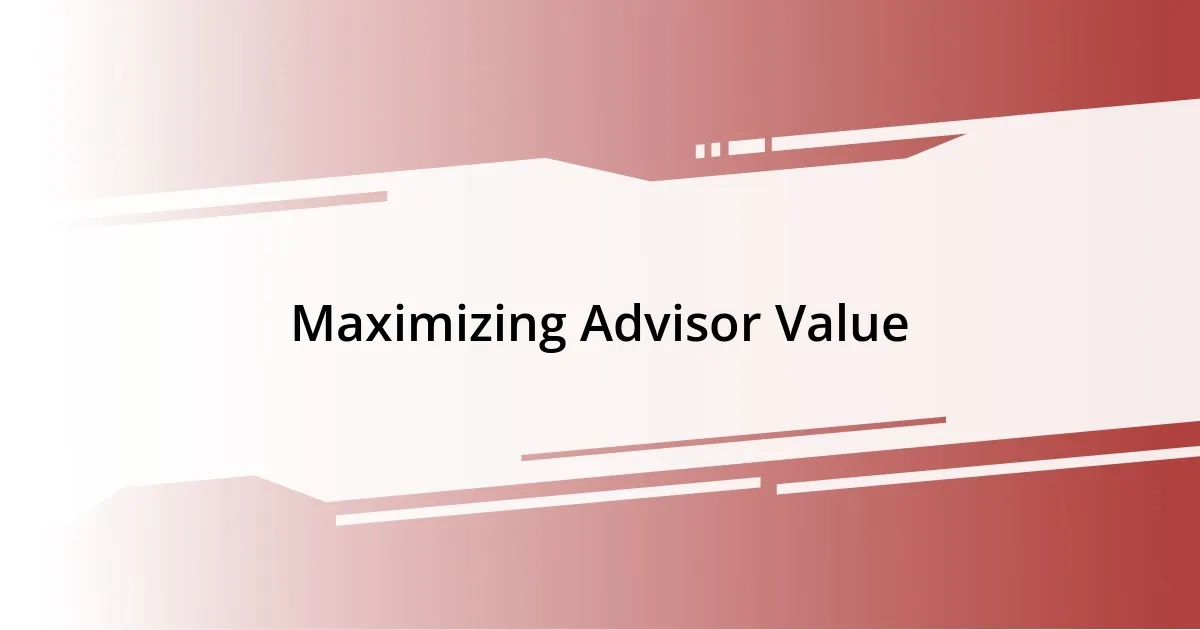
Maximizing Advisor Value
When it comes to maximizing the value I get from my financial advisor, one of the biggest lessons I’ve learned is the power of proactive communication. Early in my journey, I often left meetings feeling uncertain about my next steps. It dawned on me that I needed to be more vocal about my concerns and aspirations. By actively engaging in discussions, I not only clarified my own understanding but also helped my advisor tailor their strategies to my unique situation. Have you ever felt hesitant to speak up? Trust me; the sense of clarity that comes from open dialogue is worth it.
Another aspect I’ve found crucial is setting clear expectations from the beginning. I remember my first few meetings when I was still figuring out what I truly wanted. It felt intimidating to spell out my goals, but once I laid everything out—from my dream home to my travel plans—my advisor could design a roadmap to help me reach those milestones. Now, I always ask myself, am I giving my advisor the full picture? Clear communication is like putting the right pieces in a puzzle, allowing us to see the whole picture together.
Finally, I’ve learned the value of being open to continuous education. My advisor often shares articles, webinars, and resources that can deepen my understanding of financial concepts, and I initially hesitated to dive in. However, once I embraced this learning opportunity, I felt more empowered during our discussions. It’s made me wonder: am I fully utilizing the resources at my disposal? Keeping an open mind has not only enriched my conversations with my advisor but has also boosted my confidence in making informed decisions.
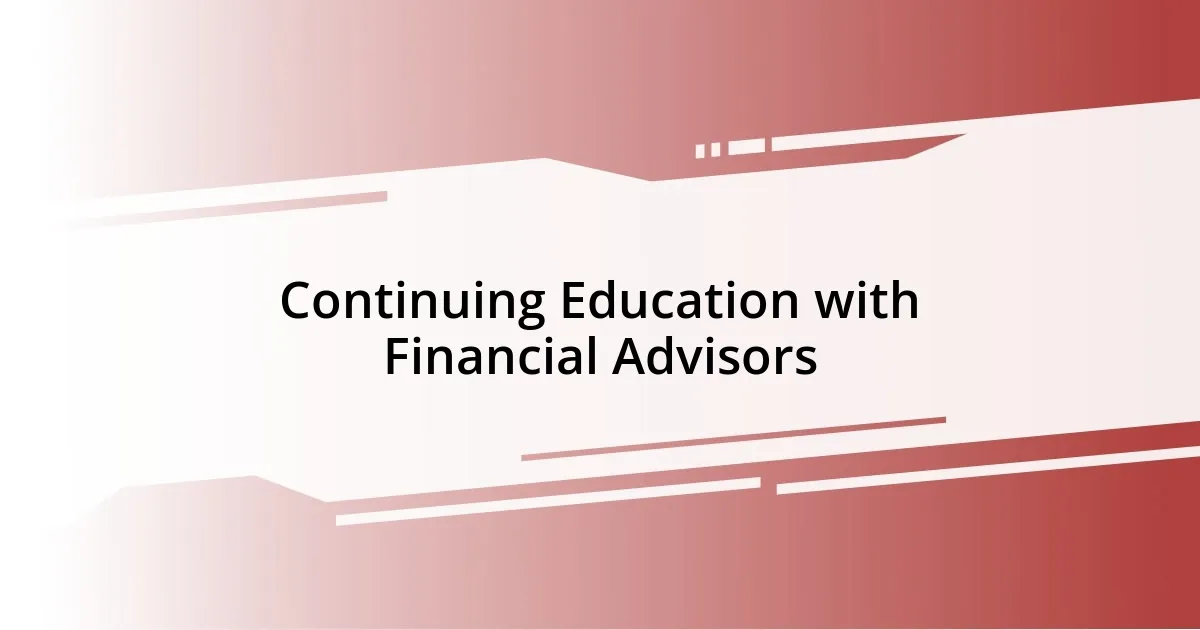
Continuing Education with Financial Advisors
Continuing education with financial advisors has been an eye-opening journey for me. I vividly recall a moment when my advisor proposed attending a financial literacy workshop together. At first, I hesitated—didn’t it seem a bit unnecessary? But once I attended, I realized how much depth it added to our discussions. I found myself more knowledgeable and confident, asking better questions and grasping complicated concepts that once felt intimidating. Have you ever taken the plunge into learning something new only to find it enriches your understanding?
One thing I appreciate about a robust continuing education approach is how it builds a stronger advisor-client relationship. There was a time when I felt somewhat disconnected from my advisor’s strategies, almost like a passenger in my financial journey. However, as I engaged in webinars and read up on investment strategies, I could feel our partnership transform. Suddenly, I wasn’t just taking their advice passively; I was actively participating in the process. The excitement of learning made our conversations so much more meaningful. Have you considered how knowledge can empower you in your financial decisions?
I can’t stress enough the importance of embracing ongoing education. When my advisor started sending me resources about market trends and investment strategies, I felt overwhelmed but also curious. Diving into those materials opened my eyes to various financial avenues I hadn’t considered. Now, I actively seek out additional educational opportunities, whether it’s podcasts, online courses, or books. It’s like building a toolkit that enriches my financial life. How valuable would it be for you to harness that knowledge to make more informed decisions?


